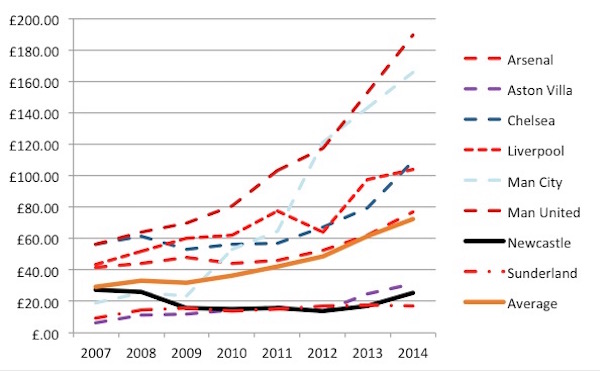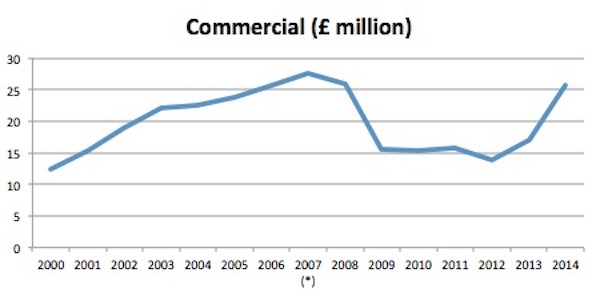Commercial revenue
Commercial revenue in football is defined as income generated through sponsorship and the sale of merchandise.
In English football, with TV revenue being distributed quite evenly compared to other nations (depending only partially on finishing league position), commercial revenue, and to a lesser extent match day revenue, cause the biggest gaps between the haves and the have nots. For that reason you would expect any owner to try and maximise this revenue stream.
The early signs were promising in this regard, with Derek Llambias confirming the importance of growing commercial revenue at a supporters’ panel (2 March 2009):
“Our commercial side is important, we’ll be out there from March trying to bring in better sources of revenue. (…) We’d like to expand our brand and we’ve taken on commercial directors”
Source: NUSC
Several months later we first found out what these plans entailed, with the announcement that the stadium naming rights for St. James’ Park were up for grabs. This was shortly followed by the “sportsdirect.com@StJames’Park” renaming in order to showcase the stadium’s ‘commercial potential’ to interested parties.
Two years later, and with no stadium sponsor in sight, Ashley decided to rename St. James’ Park to the Sports Direct Arena, in the name of commercial revenue. This is how Derek Llambias explained that decision (9 November 2011):
“Our aim for Newcastle United is to continue to deliver success for the fans and everyone associated with the club. We must make this club financially self-sufficient in order to deliver that success. To grow sustainably and allow us to invest in our future, we will need to rely increasingly heavily on commercial income.
“When we initially launched our plans at the end of 2009, we invited sponsors to attach their brand to that of St James’ Park. However it has become clear that in order to make the proposition as commercially attractive as possible, a potential sponsor must be given the opportunity to fully rebrand the stadium.
“Naming the stadium the Sports Direct Arena helps us to showcase the opportunity to interested parties. We are now actively seeking a long-term sponsor wishing to acquire full naming rights for the stadium.”
Source: The Chronicle
The club’s commitment to a ‘strong commercial programme’ was repeated by Derek Llambias upon announcing the Wonga sponsorship deal; the only commercial deal of note under Ashley, but certainly not for all the right reasons.
Interestingly, Sports Direct was mentioned as a lead commercial partner, just one who doesn’t contribute a penny to the clubs coffers. Maybe that’s why we’ll never be able to compete for ‘top honours at the highest level’ (9 October 2012):
“We are building a club that can regularly compete for top honours at the highest level.
“As everyone knows, a strong commercial programme is vital to this goal and I am delighted to welcome Wonga into the fold as our lead commercial partner, alongside Puma and Sports Direct.”
Source: The Independent
Now obviously, not only was St. James’ Park renamed to the Sports Direct Arena, but there is also the smaller matter of nearly all commercial space inside the stadium being taken over by Sports Direct (and related companies’) advertisement. A mind boggling 137 boards at the last time of counting (source: The Independent). Once again we are led to believe that this is being done to showcase the space to interested parties, as per the minutes of a recent fan forum answering the question if Sports Direct actually pay for this advertising (23 September 2013):
“The club explained that the advertising boards in question were installed with Sports Direct branding as a showcase for unused space. Sports Direct don’t pay, but it would be sold if other advertisers wanted the space.”
Source: NUFC.co.uk

However, barely six months later a completely different statement was given in a follow up fan forum meeting (24 February 2014):
“The Club suggested that while it is always proactively looking to attract new commercial partners and to sell that advertising space, in the current climate it could not command a sum for that space anywhere close to the £129m invested into the club interest free by the owner.”
Source: NUFC.co.uk

Yes, you read that right: The commercial space inside the stadium is directly linked to the interest-free loan made by Ashley. Thus making the non-payment to the club an informal type of interest, surely? It’s quite evident that Sports Direct profit massively from this free exposure, and fans have been led along the garden path with the prospect of increased commercial revenue through selling that advertisement space to interested parties. Funnily enough, the club then has the cheek to come out with the following statement in that very same fan forum meeting (24 February 2014):
“Looking at turnover, matchday and commercial revenue is a key driver because that’s where the Club can compete with – and outperform – others. In line with FFP, clubs’ own revenue can be used to enhance their spending capabilities.”
Source: NUFC.co.uk
Luckily, the board assured us that the club is in its strongest position ever commercially a month earlier (6 January 2014):
“The board explained that the club is in the strongest position it has ever been in commercially. However, while the ‘top four’ can attract significantly larger funds, NUFC has to try and compete with that and, in-turn, outperform the clubs around it.”
Source: NUFC.co.uk
So, let’s find out if the club is telling the truth for once, and analyse how our commercial revenue has fared since Ashley took over the club. As per the 2014 accounts (last accounts published), commercial revenue stands at £25.6m, reduced from a peak of £27.6m when Ashley bought the club, which still represents a 7.3% drop after a period in which the drop was even worse, as can be seen in the following diagram:
Commercial_revenue
So how does this development compare to other Premier League clubs in the same time scale? Surely, other clubs will have seen their commercial revenue drop as a result of the global economic downturn? In a word…no, as the diagram below illustrates quite clearly:
commercial_peer
In fact, literally ALL other Premier League clubs have managed to grow their commercial revenue since 2007. On average commercial revenue has grown by £24.5m per year, compared to Newcastle United’s drop of £10m per year, which has only been partly regained in the last set of accounts (2013/14). If our commercial revenue had grown even in line with other Premier League clubs since Ashley’s takeover, we would have been (and continue to be) at least £25m better off every year. That interest free loan used as justification for free Sports Direct advertising could have quite comfortably been paid off already.
All of this does beg the question: did Mike Ashley just buy Newcastle United to milk the club commercially for the benefit of Sports Direct?